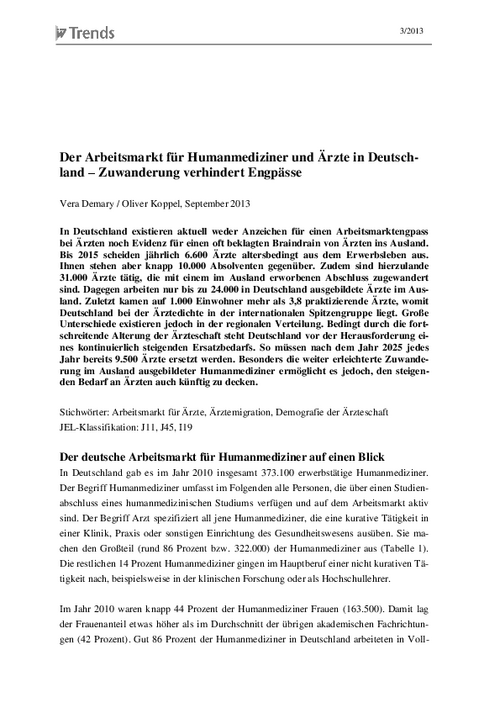Immigration Prevents Bottlenecks

The Labour Market for Doctors of Medicine in Germany
IW-Trends

Immigration Prevents Bottlenecks
In Germany there are currently neither symptoms of a bottleneck in the medical labour market nor any evidence of the oft-lamented brain drain of doctors moving abroad. Until 2015 6,600 doctors per annum are expected to retire for reasons of age. However, they will be more than compensated for by nearly 10,000 new graduates. Moreover, there are 31,000 doctors practising in Germany who have come to this country with a medical degree acquired abroad. By contrast, only up to 24,000 doctors trained in Germany work abroad. Recent statistics show that with more than 3.8 practising doctors per 1,000 inhabitants Germany has one of the highest physician densities in the world, albeit with considerable variations in regional distribution. Due to the progressive ageing of its medical profession, Germany is none the less faced with the challenge of replacing a continuously increasing number of medics. Beyond 2025, some 9,500 doctors will have to be replaced every year. However, further facilitating the immigration of doctors trained abroad is one of the most effective ways of meeting the increasing need for doctors in the foreseeable future.

Vera Demary / Oliver Koppel: Der Arbeitsmarkt für Humanmediziner und Ärzte in Deutschland – Zuwanderung verhindert Engpässe
IW-Trends

More on the topic

Securing skilled workers through immigration to universities
Against the backdrop of demographic change, Germany is increasingly dependent on skilled labour from abroad to secure growth and prosperity.
IW
Pharmaceutical industry: Increasing pressure on the labor market
The shortage of skilled workers poses significant challenges for pharmaceutical companies in Germany and is expected to become increasingly problematic in the context of demographic changes. Concerning Germany's positioning in the international competition ...
IW